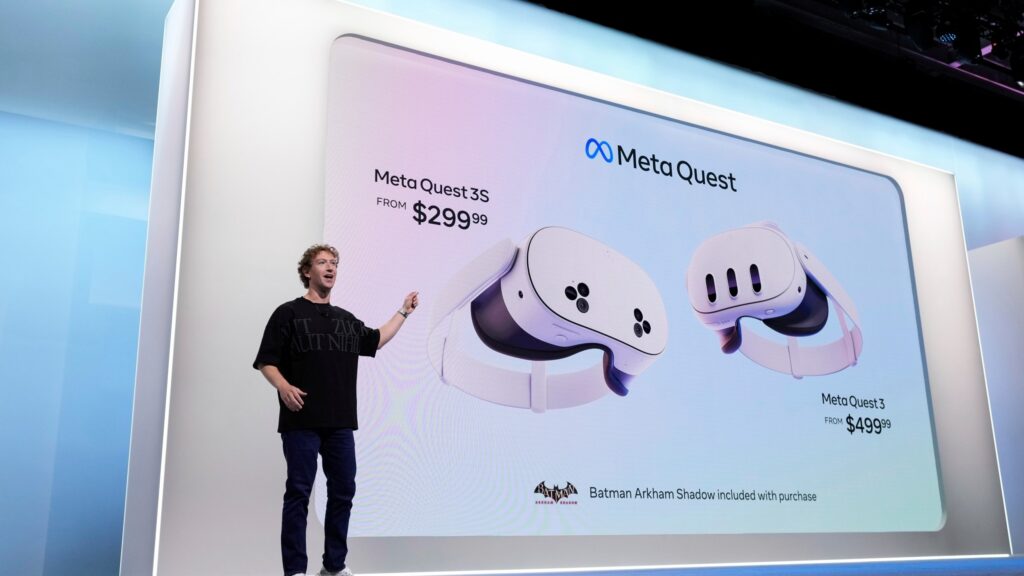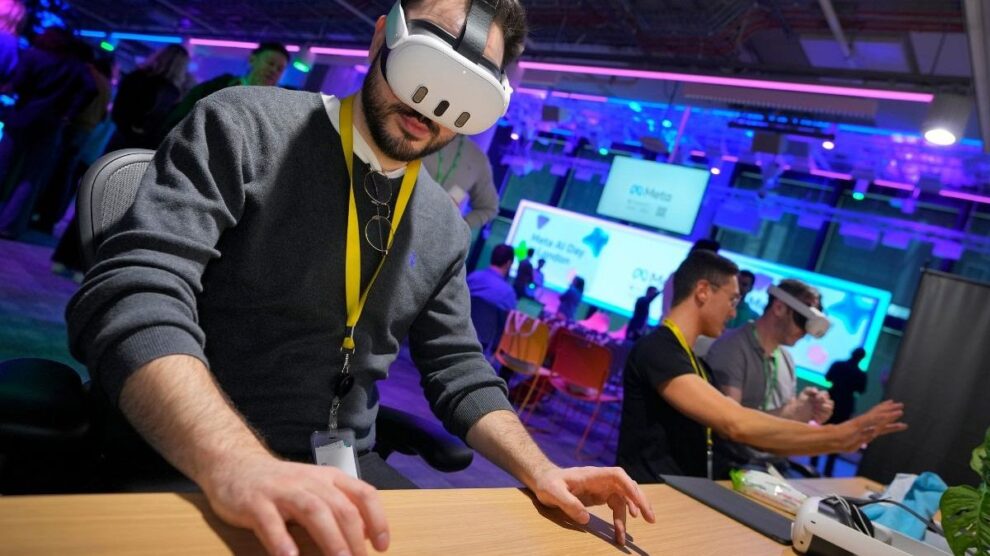At Meta’s headquarters in Menlo Park, California, CEO Mark Zuckerberg took center stage to reveal the company’s latest innovations in virtual reality, augmented reality, and artificial intelligence. The event showcased Meta’s vision for the future of computing, emphasizing a shift beyond traditional smartphones and computers.

Key Announcements
1. Orion: The Next Frontier in AR
- Described as “the most advanced glasses the world has ever seen”
- Key features:
- Holographic augmented reality capabilities
- Lightweight design (under 100 grams)
- Wireless functionality
- “Wrist-based neural interface” for brain-to-device signals
- No release date announced; presented as a “glimpse of the future”
2. VR Headset Updates
- Introduction of Quest 3S: A cheaper version of the Quest 3
- Priced at $299 (compared to $499 for Quest 3)
- Shipping starts October 15
3. Ray-Ban Smart Glasses Enhancements
- Zuckerberg highlighted their unexpected popularity
- New AI-powered features:
- Location-based reminders
- Recipe suggestions based on visual input
- Outfit recommendations
4. AI Advancements
- Updates to Meta’s Llama model
- Voice interaction with celebrity voices (e.g., John Cena, Judi Dench)
- 500 million users reported for Meta AI
- AI for influencers: Creation of AI versions for fan interaction
- Real-time translation and video dubbing capabilities
Analysis and Implications
Meta’s Strategic Direction
These announcements clearly indicate Meta’s commitment to:
- Positioning itself as a leader in AR and VR technology
- Integrating AI across its product ecosystem
- Challenging competitors in both high-end (e.g., Apple’s Vision Pro) and mid-tier AR/VR markets
- Exploring new forms of human-computer interaction, particularly through neural interfaces
Market Positioning
| Product | Target Market | Key Competitors |
|---|---|---|
| Quest 3S | Mid-tier VR consumers | Sony PlayStation VR, HP Reverb G2 |
| Ray-Ban Smart Glasses | Mainstream consumers, tech enthusiasts | Snap Spectacles, potential future Apple AR glasses |
| Orion (prototype) | Future high-end AR market | Apple Vision Pro, Microsoft HoloLens |
AI Integration Strategy
Meta’s approach to AI integration focuses on:
- Enhancing user engagement across its platforms
- Personalizing experiences through celebrity voices and AI avatars
- Breaking language barriers with real-time translation
- Positioning Meta AI as a versatile assistant across various devices and contexts
Challenges and Considerations
- Market adoption of VR technology remains a challenge, as noted by analyst Mike Proulx
- Balancing innovation with privacy concerns, especially for AI-powered glasses
- Competition from established tech giants in the AR/VR space
- The need to diversify revenue streams beyond advertising
Expert Opinions
“Meta has transformed from just a social media company into an AI powerhouse. Zuckerberg’s move to celebrity voices is not just for fun — it’s a direct challenge to OpenAI, with an emphasis on real-world utility.
“VR headsets, despite Meta’s assertion, will not go mainstream. They’re too cumbersome, and people can only tolerate them in short bursts.”
Future Outlook
As Meta continues to push the boundaries of AR, VR, and AI technologies, several key areas will be worth monitoring:
- The development and potential release of the Orion glasses
- Consumer adoption rates of the Quest 3S and updated Ray-Ban smart glasses
- Integration of AI capabilities across Meta’s product ecosystem
- Regulatory responses to advanced AI and AR technologies
- Meta’s ability to monetize these new technologies and diversify its revenue streams
Meta’s Connect 2024 event showcases the company’s ambitious vision for the future of computing and human-computer interaction. By investing heavily in AR, VR, and AI technologies, Meta is positioning itself at the forefront of what it sees as the next major shift in personal computing. While challenges remain, particularly in terms of market adoption and regulatory concerns, the potential for these technologies to reshape how we interact with digital content and each other is significant. As Meta continues to refine and expand its offerings, the tech industry and consumers alike will be watching closely to see how these innovations translate into practical, everyday applications.
Related Articles:
- The Evolution of Meta’s AI: From Facebook to Meta AI
- AR and VR Market Analysis: Trends and Predictions for 2024
- Neural Interfaces: The Next Frontier in Human-Computer Interaction










Add Comment